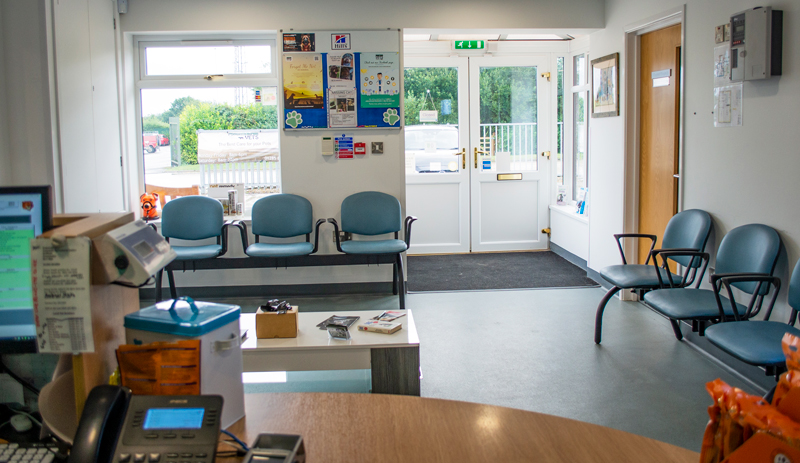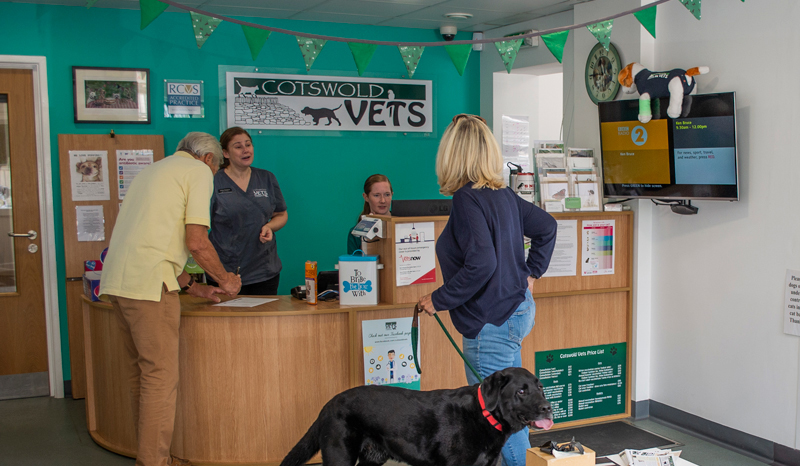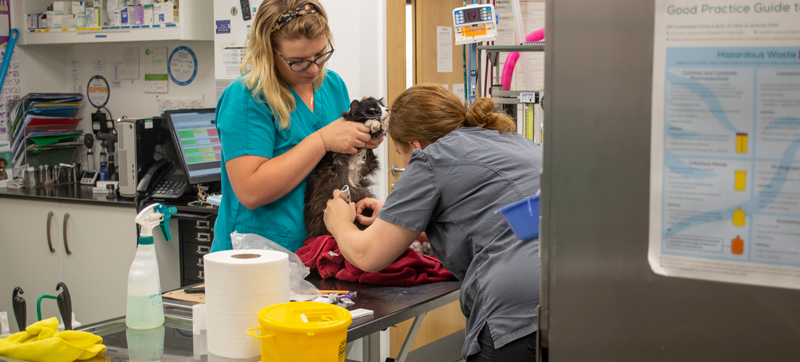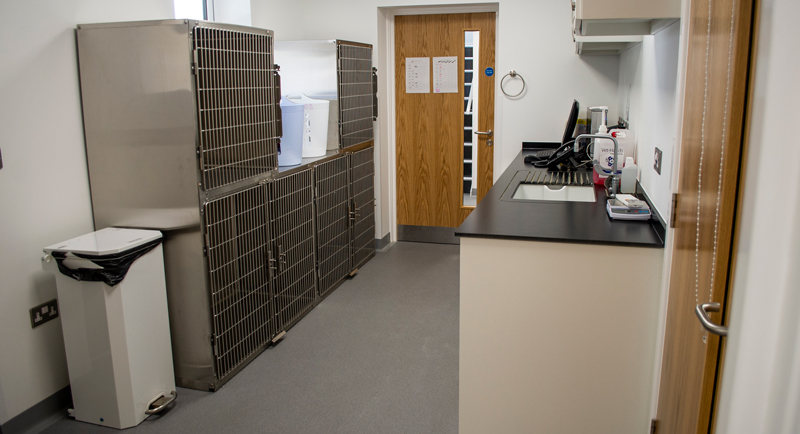12 Sept 2019
Building a small animal practice right next door to a cattle market might not seem like the best piece of logic. But for Ben Gamsa and his team at Cotswold Vets, near Swindon, it made perfect sense...

Cotswold Vets, Cirencester, Gloucestershire.
Staff: full-time vets 8 • registered veterinary nurses 11 • practice administrator 1
Fees: initial consult £42 • follow-up £42
If there was an actual instruction manual for setting up a veterinary practice then rule number one would be that location is everything.
Having the best vets and vet nurses, the best kit, loads of parking and an iron horse work ethic is all well and good, but without clients – and, more importantly, the pets they bring with them – it won’t end well.
So, on first inspection Cotswold Vets seems to be in a rather strange place, located as it is next to a large animal market miles from the nearest decent-sized village or town. Being opposite a large Mole Valley store certainly helped, however, and this business is bricks-and-mortar proof that a successful location doesn’t necessarily mean a bustling high street or retail park.
Months of research went into finding this site, but for Ben and wife Anna, after trebling the size of the practice in just five years, it was clearly time well spent.
As Ben explained, finding the right location was crucial, even if it meant moving their lives to a totally new area when the right opportunity finally came up.
He said: “Geographically, we were pretty open to consider anywhere in the south of England; it was all about the right opportunity and making the move.
“We did all the demographic work to try to capture a client base that wanted a practice that pursued the best level of clinical care and allowed us as vets to work to our strengths.
“Originally, we sent out a lot of letters to practices in the south with three vets or less asking if they had any ideas of business opportunities, such as starting a branch practice or selling out.
“We got four replies back, two of which wanted to sell us their practices, but we couldn’t afford that given their size and one who was offering use of their practice when they weren’t using it, but that wasn’t quite what we wanted. The fourth one was of real interest, though – somebody had come across this site and was interested in working with us in a joint venture/mentor type arrangement.
“She helped us get going in the first instance and we decided to pay for her services as a business consultant in the first few months until we were up and running. The rest is history.”
One of the issues Ben did have was that the site had originally been planned as a mixed animal practice with more of a focus on being a drug dispensary associated with the agricultural market next door.
However, having planning permission for a veterinary practice already in place certainly expedited the set up process, as did the fact Ben was able to borrow the £300,000 finance needed from family.
Unsurprisingly, as a young couple with limited assets and nothing more than a business plan, they may have struggled to raise those kind of funds from the banks.
Ben added: “We are enormously grateful that we were able to borrow money from family and if we didn’t have that option we would not be where we are today.
“But we still had a big job on our hands, as this was literally an empty premises leased from a farmer nearby.
“At the start we said we were willing to foot the bill for the internal layout if the landlord was prepared to give us a free rein with what we were going to do with it within the constraints of the existing external walls, roof and concrete slab floor.
“We had a set internal square footage that we had to make the most of and that is what we did. It lacked a few niceties, like a staff room and offices but it was enough to get it off the ground.”
When the practice opened, it had two consult rooms, one theatre, dog and cat wards, x-ray and a central prep space; not huge but big enough for a clinical staff that at the time consisted of just two vets (Ben and Anna) and two veterinary nurses.

From the very earliest days of the practice, Ben and Anna focused on creating the right kind of culture – one that fostered clinical development and created a real family feel among the team.
Ben describes his team as “an extended family” and that team has grown considerably over the past five years, with the practice now employing eight vets and 11 vet nurses.
But just like the location of the practice, putting the right kind of team together has taken an awful lot of work.
“I think we are very lucky that we have started from scratch as we were able to cherry pick every single staff member and we would choose every single one of them again,” Ben added. “They have been fundamental to our success and should be very proud of what they have helped to achieve.
“We were very careful to pick and choose in interviews those people we thought would fit into our team. It is a little different if you are taking something over that has an existing staff base and perhaps a different culture to the one you had wanted to create.
“If you can grow a business that has a degree of stability from a staff front, that is progressive and gives your team the chance to develop and grow as professionals, then that is an environment that people want to be a part of and one that people want to stay a part of.
“I suppose it reflects well on our culture here that we have very few members of staff who have left. In the past five years, we have only had two vets/nurses leave us, one to go travelling – which we did at her age so completely understand – and the second due to family commitments that meant a two-hour commute was unsustainable. So we are lucky to have held on to the staff members we have recruited and we hope they will still be with us for years to come.”

From day one Ben and Anna knew what kind of vet they needed. While some practices have the management infrastructure required to support new graduates, Cotswold Vets has always looked to recruit 5 to 10-year qualified clinicians with the experience to hit the ground running.
Down the years Ben has built up a base of contacts who fill that specification, something that made it easier to add the experience he needed to sustain the quality of clinical service offered as the practice expanded.
He was also well aware that the reputation his practice built up among the local veterinary profession would be vital when it came to attracting new additions to his team.
He said: “Those sort of vets with that sort of experience are often grounded to an area with family commitments and so the number of job opportunities is limited by their commutable radius.
“Those vets are more likely to move jobs by word of mouth and on a practice’s reputation among the local veterinary profession, so we have worked hard to build up that reputation so we can attract that calibre of vets to work here. It helps too that we don’t do our own out of hours.
“The same is true with the veterinary nurses and with a huge variety of experience, as well as postgraduate certificates among the nursing staff, it has always been of paramount importance to us that we have the best in the business.”
One of the things Ben admitted to struggling with in the early days was delegating to other members of the practice team. Having worked so hard to get Cotswold Vets off the ground and define a working culture, it took time for him to feel comfortable leaving the business in the hands of others.
This meant days off were mostly non-existent in the early days, but having just returned from a much needed holiday with his wife and two young children, it is clear this is no longer a problem.
“In the early days you do have that tendency to over control things,” he explained. “It is the sort of thing that takes a mind shift and a bit of self talking to in order to make that sideways leap of faith, because you are so used to doing everything the way you want it done.
“But I needed to realise that the set protocols I had established that worked for me might not work for everyone, so it is important to let others have the freedom to flourish. Seeing that delegation working and seeing the culture spread and develop among the team is hugely rewarding.
“To be able to leave the business in the hands of the staff for a week or two and having complete trust in my team to run things efficiently and reliably is a massive weight off of my shoulders. It’s important for me to have time to spend with my family too, as that’s a big part of why we decided to start our own business in the first place so that we could choose the days and hours we worked. Anyone who owns a business will know just how challenging that juggling act is, though, and much as I confess to not getting it right just yet, it’s definitely getting better.”

Another big moment was when Ben realised that the business – which turned over close to £1 million last year – had grown so much, so quickly that he needed to treble the size of its physical footprint.
With 13 people working in a practice with just two consult rooms and one theatre, the clinical team was struggling for space while there were also concerns that the client journey was not what it could be with the lack of appointment availability and fight for consult rooms.
So rather than tackle his outstanding debt burden – which currently stands at £250,000 – Ben decided to pour the money he had back into the business.
He said: “We needed more consult rooms to open up more client appointments and we also needed to build some of the bits we didn’t have. Back then it was 13 people we were employing and now we are up to 19. We would have been struggling at this point if we hadn’t done the development and doubling the number of consult rooms, adding an office and a staff room, a second theatre, a dental suite and all the other bits.
“It is a massive risk to invest all that money back in, but life is a risk whether you invest in houses, stocks or even leave your money in the bank and I would rather take a risk gambling on my wife and I than anything else.
“Of course, there were doubts that we could get enough clients to make a bigger building work once you have tripled the rent and the building rates and electric etc – but so far so good.”

The new two-storey extension is already being put to good use, as is much of the new equipment bought in to fill it. While the practice does refer when needed to, investment in a lot of state-of-the-art kit – including £60,000 of endoscopy equipment, cryotherapy and dental x-ray – has enabled them to make the most of the staff’s clinical interests.
With postgraduate certificates holders in surgery, cardiology, medicine, diagnostic imaging, feline medicine and emergency medicine and surgery, as well as experienced all-round general practitioners with varying interests, it’s clear there are plenty of highly qualified staff members able to provide a high-level service across multiple disciplines.
The latest round of development – which was part funded by the landlord – cost in the region of £500,000, with £100,000 of that coming straight out of Ben’s pocket.
It is a lot of cash but the investment should mean Cotswold Vets is well prepared for the future.
Ben added: “We are delighted with the latest work and just so amazed that the practice has grown so well.
“We just want to make this work as best as we can, keep the staff morale as high as possible and just make sure this is a practice that people want to work in.
“At the moment I do three days a week at work and three days a week at home on the management side of things, which fits around nursery drops offs and pick ups as well as juggling the kids at the weekend, although it’s fair to say my wife does the lion’s share of that. Sam’s return as practice manager will definitely help me to get back to more clinical work and getting time to finish my endoscopy and endosurgery certificate next year, so I’m definitely looking forward to helping her get to grips with it all.
“The size of the practice feels about right for me now and we never set out on this road for global domination and to open branches everywhere.
“It has been a difficult road at times, but we are so glad we did it. For people reading this maybe thinking about doing the same thing and starting their own independent practice, I would say go for it and offer one piece of advice: try not to lose the passion.”